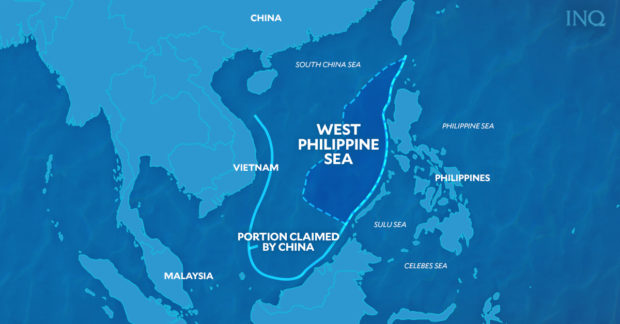8 of 10 Filipinos want PH to work with US on West Philippine Sea row

The West Philippine Sea is part of the archipelagic sea lanes that the bill proposes to establish.
MANILA, Philippines — Eight out of 10 Filipinos said that the Philippines should work with the United States to resolve the continuing tensions in the West Philippine Sea, according to a Pulse Asia survey.
Pulse Asia released the survey results on Tuesday during a forum held at Manila Polo Club— “Fortifying Cyber Cooperation Towards Digital Security.” The forum was organized by the think tank Stratbase ADR Institute, which also commissioned the survey.
Pulse Asia asked the question: “In view of the continuing tension in the West Philippine Sea and its implications on the country’s security and economy, which country or organization should [President Ferdinand “Bongbong”] Marcos [Jr.’s] administration work with?”
Asked to name up to three countries, 79 percent of the 1,200 respondents said they want the administration to work with the United States, while almost half of Filipinos answered Australia (43 percent) and Japan (42 percent).
On the other hand, only 10 percent of Filipinos favored working with China.
The mostly favorable opinion of respondents to the US and Japan as well as China’s low percentage points did not surprise experts.
“As evidenced by the survey results, 90 percent of Filipinos are not in favor of working with China. This is only natural, as the Philippines continue to encounter aggressive and coercive acts in the West Philippine Sea,” said Stratbase President Dindo Manhit in a statement.

China’s low ratings ‘not surprising’
“These countries have continued to voice their support for the Philippine position and have condemned Chinese actions against Filipino vessels,” Manhit said of the US and Japan.
Sought for his comment on China’s low ratings, maritime security expert Jay Batongbacal, director of the University of the Philippines Institute for Maritime Affairs and Law of the Sea, told reporters at an event in Taguig: “It’s not surprising because historically the level of trust in China has been very low.”
As to the favorable rating of Japan and Australia, Batongbacal said: “I think that is attributable to their increased visibility, they did many high-profile activities.”
Batongbacal noted the recent visit of Japanese Prime Minister Fumio Kishida and Australia’s military exercises, like the joint patrol in the West Philippine Sea and the amphibious exercises held in Zambales and Palawan last year.
Meanwhile, results from the same Pulse Asia survey also revealed that the majority — or 55 percent — of Filipinos believe that the Marcos administration can fulfill its promise of protecting the West Philippine Sea against the illegal and aggressive actions of other countries.
On the other hand, 35 percent can’t decide on the matter, while 10 percent said they don’t believe that Marcos can fulfill its promise of protecting the West Philippine Sea.
According to Manhit, Marcos is aware that there are gaps to be addressed in the issue. He also observed that there had been “very little progress” and that diplomatic efforts with China are heading in a “poor direction,” prompting his call for a “paradigm shift” in the country’s approach.
“As the Philippines moves on its third year under his administration, the Filipino public will hold him accountable for turning these statements and planned approaches into actual, effective actions,” Manhit said.